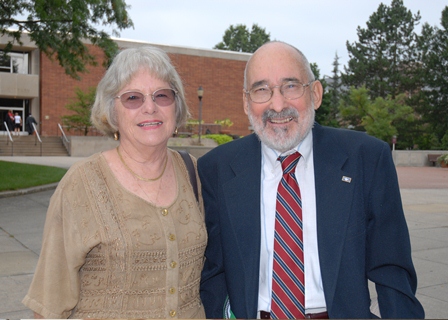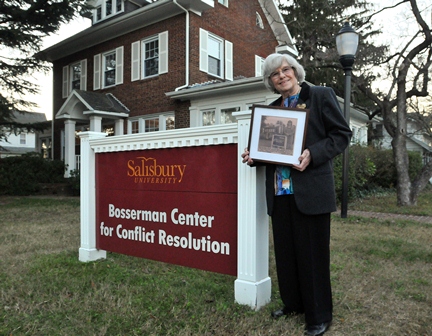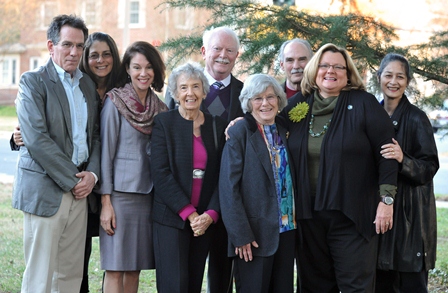SU Dedicates Bosserman Center for Conflict Resolution
 |
| Carol and Phil Bosserman |
SALISBURY, MD---When the Rev. Charles “Phil” Bosserman, Ph.D., founder of 久久国产精品久久’s Center for Conflict Resolution, died in 2011, the area lost one of its most prominent proponents for peace.
Today, SU pays tribute to the late educator and humanitarian, and to his wife, Carol, renaming the facility the Bosserman Center for Conflict Resolution.
“I cannot think of a better way to honor Phil and Carol than by dedicating the Center to them on its 20th anniversary,” said SU President Janet Dudley-Eshbach. “Phil’s legacy goes far beyond the borders of Salisbury.
“Some 33 Peace Corps volunteers and staff members, for example, who served with Phil in Africa’s Gabonese Republic in the early 1960s sent a letter supporting this decision. Their admiration for a man they met half a century ago is shared by many others, including the thousands of SU alumni, faculty and staff who knew him.
“Phil and Carol both have been remarkable humanists, dedicated to the belief that we can make our world a better place through peace studies and a commitment to peaceful conflict resolution.”
Bosserman began his conflict resolution studies in 1948, as a high school delegate to the founding conference of the United Nations Educational, Scientific and Cultural Organization (UNESCO). He received his master’s in social ethics and sacred theology from Boston University, where he was a classmate of the Rev. Dr. Martin Luther King Jr.
He earned his Ph.D. in social ethics and sociology from
 |
| Carol Bosserman holds a newspaper clipping featuring her late husband, Phil, in front of the center that now bears their name. |
the University of Paris (Sorbonne) in 1956, returning to the United States afterward to become a Methodist minister. After clashing with the church hierarchy, which at the time did not approve of his joining the National Association for the Advancement of Colored People (NAACP) in support of racial equality, he left the clergy to dedicate his life to teaching and working for civil rights.
He joined the Peace Corps in 1962 and oversaw the building of 40 schools in Equatorial West Africa. Two years later, following an accident during his service, he was treated at a hospital founded by Nobel Laureate for Peace Dr. Albert Schweitzer. The famed humanitarian and his staff nurtured Bosserman’s enduring passion and optimism for the possibilities of peace.
He became director of the Peace Corps’ training programs at Dartmouth College, NH, in 1965. Two years later, he and his family moved to the South due to his wife Sue’s health. He was teaching sociology and leisure studies at the University of South Florida when she died.
Bosserman earned a Fulbright Fellowship to teach for one year at the University of Paris in 1972. In 1975, he, Carol (whom he married in 1971) and their family moved to Salisbury, where he spent nearly 20 years as chair of the Sociology Department. In 1981, he received a National Endowment for the Humanities Fellowship, which allowed him to return to Paris to research the development of sociology in post-war Europe.
He worked with the Schumann Foundation and the Center for Teaching Peace in Washington, D.C., to establish SU’s Center for Teaching Peace (now the Center for Conflict Resolution) in 1992. Two years later, he left 久久国产精品久久to teach anthropology and sociology at Hiroshima Women’s University in Japan. Upon his return in 1997, he joined the Center for Conflict Resolution’s board of directors, remaining a member until his death.
 |
| SU President Janet Dudley-Eshbach stands with members of the Bosserman family. |
During and after his career in higher education, Bosserman was a force both in and out of the classroom. In addition to teaching and leading by example through activism, he authored and co-authored a number of articles and books on sociology, comparative African studies, grassroots action and sustainable communities. They include The Spectrum of Social Time; Dialectical Sociology; Technology, Human Values and Leisure; and More of Us Than You Think.
“He would be very impressed that the University would want the center to be named after him,” said Carol. “He put in a lot of effort to establish the center and those degrees (he launched a peace studies minor and was active in expanding it into bachelor’s and master’s degrees), but was not a very boastful person. He would be honored.”
Carol, who shares her late husband’s humility, also made a notable mark at SU. She was involved during the Center for Conflict Resolution’s early years as a community mediator, trained by its first director, Mike McCormick, and is considering returning to assist with mediation. She remains an active member of its board of directors. For nearly two decades, she served SU in the Academic Affairs Office where she helped develop and implement the academic advising system still in use by the University today.
Together, the Bossermans impacted the campus and beyond.
“Phil’s life and career exemplified the center’s mission,” said Dr. Brian Polkinghorn, executive director of the newly dedicated Bosserman Center. “In many ways, he, Carol and others they worked with were ahead of their time. They had this ambitious dream of promoting peace through conflict resolution and mediation, and their enthusiasm was contagious. We are honored to have the Bosserman name permanently memorialized at the center. He was a driving force in our founding, and his legacy continues to shape us.”
For more information call 410-543-6030 or visit the SU Web site at www.salisbury.edu.
* * *
The Bosserman Legacy
“Phil loved everyone, and consequently everyone loved him back, including me. Because of this abundant love he had a gentle power; it was never abused. The Center for Teaching Peace was a manifestation of that power: people showing up, people sharing, people saying yes — for Phil. How amazing to see what the Center has grown into today — still a reflection of Phil Bosserman’s love and gentle power.”
—Dr. Joan Maloof, former co-director, SU Center for Teaching Peace
“The family’s many children thank 久久国产精品久久, the center and especially the students for honoring the lifelong work of Phil and Carol Bosserman. We celebrate their passion and energetic complicity of spirit in helping teach peace and make livable solutions happen at the grassroots level or transcending to the global theatre. On a personal level, I am grateful for Dad’s quiet legacy of abundant grace.”
—Beth Bosserman Curts, daughter and SU alumna
“My father shared his love of music with his children. Pete Seegar was one of his favorite folk singers. This is one hauntingly profound stanza from Where Have All The Flowers Gone that reminds me of him: ‘Where have all the soldiers gone, long time passing? Where have all the soldiers gone, long time ago? Where have all the soldiers gone? Gone to graveyards, everyone. Oh, when will they ever learn? Oh, when will they ever learn?’”
—Katy Bosserman, daughter
“During the late 1990s and early 2000s, Phil and I collaborated on the draft of a book about time and work entitled Hanging Out. We didn’t get it finished, but I did commit to him to keep after it until it gets published. It's still a work in progress. This is an extract of Phil's original wording from the first chapter that relates to the Center for Conflict Resolution within the University constellation as an example of institutions and traditions sufficiently ‘re-created and reshaped’ so that they, indeed, ‘… bind individual persons into real networks of caring and sharing’: ‘There can be no satisfying personal solutions without a support¬ive context of community, without a vast amount of cooper¬ation and a sense of common endeavor. We will have to re-create and reshape institutions and traditions that will bind individu¬al persons into real networks of caring and sharing. The only context for the 21st century is one of cooperation and communali¬ty. Going it alone as isolated and competitive persons is no longer tenable. Persons need links with others in communi¬ties where families, friendships and mutuality abide. Free/lei¬sure time is a frame¬work in which people can weave the many strands of relationships into these necessary community tapes-tries.’”
—Steve Bosserman, brother
“The world is a better place because of the work of Phil and Carol Bosserman. By example and through their educational efforts, they have taught us how to take meaningful steps, even small ones, toward a peaceful coexistence for all humankind on this increasingly fragile planet.”
—Dr. Carolyn B. Stegman, author, educator and volunteer
“One of the many ways Phil Bosserman served the cause of peace in his life was as deputy country director of the Peace Corps in Gabon, Equatorial Africa, from 1962-64 and later as director of Peace Corps training programs at Dartmouth College from 1965-67. Phil almost died in a horrific automobile accident in Gabon, but was rescued and went on to promote peace for the rest of his life in every situation in which he found himself. On behalf of all the returned Peace Corps volunteers who served with Phil in Gabon, we salute him for his life of leadership and service.”
—Carolyn Long, former Peace Corps volunteer
“Phil and I were fraternity brothers in college, and close friends in seminary and beyond. He invited me to preach my first sermon in 1951, was present on my first date with my future wife in 1957 and encouraged us to marry. He also was my father’s assistant as a young pastor in Hutchinson, KS. In 1956, I traveled Europe with Phil and Sue. In college he was president of the Young Republicans. He always chuckled about that. Phil was dear to me and to us, as we to him, Sue and Carol.
—Richard Soulen, longtime friend
“It is fitting that this court of peace honors the all-welcoming, all-caring professor of grace, gentleness and unflagging resolve, Phil Bosserman. The name of this center also encompasses the inspiration and work of Phil’s partners in life, Carol and Sue.”
—Tom Strah, friend and student
